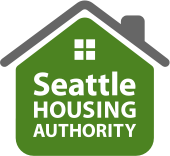SEATTLE — August 2, 2012 — Working in partnership with the City's Office of Housing, Seattle Housing Authority is once again making available 50 project-based rental vouchers to qualified nonprofit organizations. The deadline to apply for these vouchers is Monday, Friday, August 31, 2012.
The vouchers will make it possible for organizations selected to offer housing units to extremely-low-income residents, those with incomes below 30 percent of median income, for 40 years.
"These vouchers are part of Seattle Housing Authority's commitment to maintaining and increasing the city's stock of low-income housing," said Lisa Cipollone-Wolters, director of rental assistance and housing advocacy, said recently.
With the redevelopment of Seattle Housing Authority's family communities at NewHolly, Rainier Vista and High Point, low-income units have been "de-concentrated" from these areas and spread across the city. Early in the process, Seattle Housing committed to replacing all low-income units that were demolished through the redevelopments.
Through a Request for Proposals (RFP), Seattle Housing in partnership with the City is soliciting proposals for use of these 50 project-based vouchers by nonprofit housing developers. Details of the RFP are available on the City of Seattle website.
Many nonprofit housing providers provide affordable rental housing that meets the needs of residents earning between 30 and 60 percent of Area Median Income. With receipt of the additional subsidy that project-based vouchers provide, nonprofit housing providers can provide rentals that are affordable well below this level.
This offering of vouchers is designated to subsidize replacement housing for units that were demolished during the redevelopment of the High Point community. Subsidies will support an inventory of housing units that contain two or more bedrooms. The units must be designated for households with incomes of 30 percent or less of Area Median Income.
The housing developer applying for these vouchers must commit to keeping affected housing units in its inventory and available for rent to low-income residents for at least 40 years.
Preference will be given to mixed-income projects located in neighborhoods that do not already have a high percentage of households subsidized with vouchers.
Because the voucher subsidy comes from the U.S. Department of Housing and Urban Development, the project will undergo a review to determine whether any other federal funds were involved in the original financing of the project. Funding sources requiring this "subsidy layering" review include low-income housing tax credits, tax-exempt bonds, HOME funds and McKinney Supportive Housing Funds that provide funding to house homeless people.
The use of other federal funds does not automatically exclude the project from eligibility for these vouchers. However, voucher subsidy may not duplicate other rental subsidy that the organization is already receiving.
In order to be eligible for these vouchers, housing units must pass inspection by a Seattle Housing Authority inspector who will determine whether or not the units meet federal housing quality standards.
